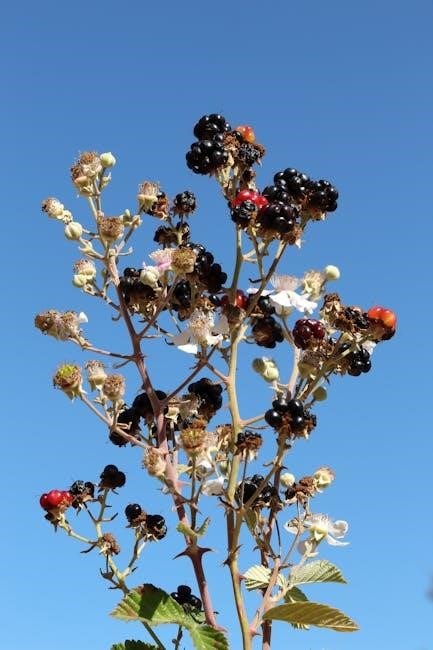Lymphedema is a chronic condition characterized by lymphatic fluid accumulation, leading to swelling and inflammation. While treatments like CDT are standard, diet plays a crucial role in managing symptoms. A balanced diet rich in protein, fiber, and antioxidants can help reduce inflammation and improve lymphatic function. Although no specific diet is proven to cure lymphedema, nutritional strategies can enhance overall well-being and support treatment outcomes. Downloading a lymphedema diet PDF guide provides practical tips and recipes for effective management.
Understanding Lymphedema
Lymphedema is a chronic condition characterized by the abnormal accumulation of lymphatic fluid in interstitial tissues, leading to swelling, inflammation, and fibrosis. It often results from impaired lymphatic function due to surgery, infection, or genetic factors. This condition affects over 250 million people worldwide and can cause distorted limb contours, immune dysfunction, and discomfort. While incurable, lymphedema can be managed with therapies like Complete Decongestive Therapy (CDT) and lifestyle adjustments, including dietary changes, to alleviate symptoms and improve quality of life.
The Importance of Nutrition in Managing Lymphedema
Nutrition plays a pivotal role in managing lymphedema by supporting the lymphatic system and reducing inflammation. A balanced diet helps control swelling, enhances tissue repair, and prevents complications. It focuses on minimizing pro-inflammatory foods and optimizing nutrient intake to alleviate symptoms. Proper nutrition not only aids in fluid balance but also supports overall health, improving the quality of life for individuals with lymphedema. A tailored dietary approach can significantly impact long-term management and well-being.

Key Principles of a Lymphedema Diet
A lymphedema diet focuses on balanced, nutrient-dense meals rich in anti-inflammatory foods, emphasizing whole grains, lean proteins, and healthy fats while minimizing sodium and sugary processed foods.
Protein Intake for Tissue Repair
Protein is essential for tissue repair and maintaining muscle mass, which supports lymphatic function. Include high-quality sources like lean meats, fish, eggs, dairy, and plant-based options such as legumes and tofu. Protein helps reduce muscle wasting and supports the growth of new lymphatic vessels. Aim for 1.2–1.6 grams of protein per kilogram of body weight daily. Moderate intake is key to avoid overloading the lymphatic system. Consult a healthcare provider to tailor protein needs to individual circumstances.
Fiber-Rich Foods for Digestive Health
Fiber-rich foods are crucial for maintaining digestive health, which supports overall lymphatic function. Foods like fruits, vegetables, whole grains, and legumes promote regular bowel movements and prevent constipation. Fiber also helps balance gut bacteria, reducing inflammation. Aim for 25–30 grams of fiber daily from sources like berries, leafy greens, and oats. Gradually increase fiber intake to avoid discomfort and ensure adequate hydration to facilitate digestion and prevent strain on the lymphatic system.
Healthy Fats and Omega-3 Fatty Acids
Healthy fats, particularly omega-3 fatty acids, play a vital role in reducing inflammation and supporting lymphatic health. Foods rich in omega-3s, such as fatty fish (salmon, mackerel), flaxseeds, and walnuts, help minimize swelling and promote healing. Avocados and olive oil are excellent sources of monounsaturated fats, which improve circulation and overall cardiovascular health. Incorporating these fats into your diet can enhance lymphatic function and aid in managing lymphedema symptoms effectively.
Reducing Sodium and Added Sugars
Reducing sodium and added sugars is crucial for managing lymphedema, as excessive sodium can increase fluid retention and swelling. Focus on whole, unprocessed foods to avoid hidden sodium and sugars. Opt for fresh vegetables, lean proteins, and whole grains, flavoring with herbs instead of salt. Limit sugary drinks and snacks, which can exacerbate inflammation and worsen symptoms. Aim to cook at home using fresh ingredients to control sodium and sugar content effectively.

Recommended Foods for Lymphedema Management
Emphasize fruits, vegetables, lean proteins, and whole grains to reduce inflammation and fluid retention. These foods support lymphatic health and overall well-being in lymphedema management.
Whole Grains and Their Benefits
Whole grains like quinoa, brown rice, and oats are rich in fiber, vitamins, and minerals. They help manage inflammation, improve digestion, and stabilize blood sugar levels. Incorporating whole grains supports lymphatic function and reduces fluid retention, making them an essential part of a lymphedema-friendly diet. They also provide sustained energy and promote overall nutritional balance, which is crucial for managing lymphedema symptoms effectively. Always choose unprocessed, whole grain options for maximum benefits.
Anti-Inflammatory Foods
Anti-inflammatory foods are essential for managing lymphedema, as they reduce swelling and promote healing. Fatty fish like salmon and mackerel, rich in omega-3 fatty acids, are highly beneficial. Berries, turmeric, and ginger also have potent anti-inflammatory properties. Incorporating these foods into your diet can help alleviate lymphedema symptoms and support overall health. They complement other dietary strategies and contribute to a balanced approach in managing lymphedema effectively.
Hydration and Fluid Management
Proper hydration is crucial for lymphedema management, as it aids the lymphatic system in functioning effectively. Drinking plenty of water helps maintain fluid balance and prevents dehydration, which can thicken lymph fluid and impede its flow. Limiting caffeinated and carbonated beverages is advisable, as they can act as diuretics or cause bloating. Incorporating herbal teas and water-rich foods, such as cucumbers and watermelon, supports hydration without overloading the system. Balancing fluid intake and managing sodium consumption help reduce swelling and promote overall lymphatic health.

Foods to Avoid in a Lymphedema Diet
Foods to avoid include processed meals, high-sodium items, and saturated fats, as they can worsen swelling and hinder lymphatic function. Opting for fresh, whole foods is better.
Refined Grains and Processed Foods
Refined grains, such as white bread and pasta, and processed foods like snacks and ready-to-eat meals, should be minimized. These foods often lack nutrients, cause inflammation, and can lead to fluid retention. Processed items typically contain additives and preservatives that may slow lymphatic circulation. Opting for whole, unprocessed foods helps maintain better lymphatic health and reduces the risk of exacerbating symptoms. Whole grains like brown rice, quinoa, and oats are healthier alternatives.
High-Sodium Foods
High-sodium foods can worsen lymphedema by increasing fluid retention and swelling. Foods like canned soups, processed meats, and frozen meals are often high in sodium. Excessive salt intake can strain the lymphatic system, making it harder to manage swelling. Limiting sodium intake to less than 2,300 mg daily is recommended. Opt for low-sodium alternatives, season with herbs, and cook from scratch to better control sodium levels and support lymphatic health.
Saturated and Trans Fats
Saturated and trans fats can exacerbate lymphedema by promoting inflammation and impairing lymphatic flow. These fats, often found in fried foods, butter, lard, and processed snacks, can increase swelling and discomfort. Reducing intake of these fats helps minimize inflammation and supports lymphatic health. Opting for unsaturated fats, such as those in avocados and olive oil, is a healthier alternative that aids in managing lymphedema symptoms effectively.

Weight Management and Lymphedema
Weight management is crucial for lymphedema patients, as excess weight can worsen swelling and impair lymphatic function. Maintaining a healthy weight reduces symptoms and improves overall well-being.
Maintaining a Healthy Body Weight
Maintaining a healthy body weight is essential for lymphedema management, as excess weight increases lymphatic pressure and swelling. A balanced diet combined with regular physical activity helps manage weight effectively. Excess fat, particularly around the abdomen, can impair lymphatic function, worsening symptoms. Monitoring calorie intake and avoiding overeating are crucial. A tailored diet focusing on nutrient-dense foods supports weight stability, reducing the strain on the lymphatic system and improving overall well-being.
Weight Loss Strategies for Lymphedema
Weight loss for lymphedema should focus on gradual, sustainable changes. Portion control, mindful eating, and avoiding high-calorie foods are effective strategies. Incorporating low-intensity exercises, like swimming or yoga, can help reduce fat without overloading the lymphatic system. Prioritizing protein-rich meals aids in maintaining muscle mass during weight loss. Consulting a healthcare provider ensures a personalized plan that aligns with lymphedema management goals and prevents malnutrition or excessive strain on the body.

The Role of Supplements in Lymphedema
Supplements can support lymphedema management by reducing inflammation and enhancing overall well-being. Antioxidants and omega-3 fatty acids are commonly recommended to aid in symptom relief and recovery.
Antioxidants and Their Benefits
Antioxidants play a crucial role in managing lymphedema by reducing oxidative stress and inflammation. Vitamins C and E, along with selenium, are potent antioxidants that protect cells from damage. These nutrients help minimize swelling and improve circulation, which can alleviate lymphedema symptoms. Incorporating antioxidant-rich foods, such as berries, leafy greens, and nuts, into your diet can enhance overall health. Supplements may be recommended, but always consult a healthcare provider for proper guidance. Antioxidants are a key component of a comprehensive lymphedema management plan.
Omega-3 Fatty Acid Supplements
Omega-3 Fatty Acid Supplements
Omega-3 fatty acids, particularly EPA and DHA, are potent anti-inflammatory agents that can help reduce swelling and improve blood flow, benefiting lymphedema management. Found in fish oil and flaxseeds, these supplements support immune function and overall vascular health. While food sources are ideal, supplements can fill nutritional gaps. Always consult a healthcare provider before starting omega-3 supplements to ensure appropriate dosing and safety. They complement a balanced diet and lifestyle changes for managing lymphedema effectively.
Comparing Popular Diets for Lymphedema
Popular diets like DASH, Mediterranean, and Ketogenic are compared for lymphedema management, focusing on anti-inflammatory foods, reduced sodium, and balanced nutrition to support lymphatic health effectively.
The DASH Diet and Its Relevance
The DASH (Dietary Approaches to Stop Hypertension) Diet emphasizes whole grains, fruits, vegetables, lean proteins, and low-fat dairy while reducing sodium and processed foods. Its balanced approach aligns with lymphedema management by promoting anti-inflammatory foods and aiding weight management, which is crucial for reducing lymphatic strain. The DASH Diet’s focus on nutrient-dense foods supports overall health and may help mitigate lymphedema symptoms by maintaining a healthy weight and minimizing inflammation.
The Mediterranean Diet and Lymphedema
The Mediterranean Diet focuses on fruits, vegetables, whole grains, nuts, seeds, olive oil, and fish, while minimizing processed foods and red meat. Its emphasis on anti-inflammatory foods like fruits and vegetables, along with healthy fats from olive oil and omega-3s from fish, can help reduce inflammation associated with lymphedema. Additionally, the diet supports weight management, crucial for managing lymphedema symptoms. This balanced approach promotes lymphatic health and may alleviate lymphedema discomfort.
The Ketogenic Diet as a Potential Option
The ketogenic diet, high in fats, moderate in protein, and low in carbohydrates, may support lymphedema management by reducing inflammation and promoting weight loss. Its focus on whole, nutrient-dense foods aligns with lymphedema dietary goals. However, the restrictive nature of the diet may require careful planning to ensure adequate nutrition. While some patients report benefits, more research is needed to confirm its long-term effectiveness for lymphedema. Consultation with a healthcare provider is essential before starting this diet.

Case Studies and Research Findings
Research highlights dietary interventions reducing lymphedema swelling and improving quality of life. Case studies show personalized nutrition plans effectively managing symptoms and enhancing overall well-being.
Studies on Dietary Interventions for Lymphedema
Clinical trials demonstrate that tailored dietary approaches significantly reduce lymphedema symptoms. A study published in the Journal of Lymphology revealed that participants following a low-sodium, high-protein diet experienced a 20% reduction in swelling over six months. Another trial emphasized the benefits of anti-inflammatory foods and whole grains in improving circulation. These findings underscore the importance of evidence-based dietary interventions in managing lymphedema effectively and enhancing overall well-being.
Success Stories from Lymphedema Patients
Patient testimonials highlight the transformative impact of dietary changes on lymphedema management. Many report reduced swelling and improved mobility after adopting anti-inflammatory and low-sodium diets. One patient shared a 30% reduction in arm swelling within three months of switching to whole, nutrient-rich foods. These success stories emphasize the empowerment that comes with proactive dietary choices, offering hope and motivation for others to take control of their lymphedema journey.

Lifestyle Modifications Beyond Diet
Beyond diet, lifestyle changes like regular exercise, stress reduction, and adequate sleep significantly improve lymphedema management, enhancing circulation and overall well-being.
Exercise and Physical Therapy
Exercise and physical therapy are crucial for managing lymphedema. Gentle activities like swimming, yoga, and cycling improve lymphatic circulation without overstraining the body. Strengthening exercises, when guided by a therapist, can enhance mobility and reduce swelling. Manual lymphatic drainage, a specialized massage technique, is often incorporated into physical therapy to promote fluid drainage. Consistency in these practices helps maintain limb function and overall well-being. Always consult a certified lymphedema therapist to design a safe, personalized program. Regular movement supports long-term management and improves quality of life.
Stress Management Techniques
Managing stress is vital for overall health, especially for those with lymphedema. Techniques like deep breathing, meditation, and mindfulness can help reduce stress levels. Gentle exercises such as yoga or tai chi may also aid in relaxation and improving circulation. Cognitive-behavioral therapy (CBT) can address emotional challenges and promote coping strategies. Prioritizing rest and maintaining a balanced lifestyle are key to managing stress effectively. Always consult a healthcare provider before starting new stress management practices.

Monitoring Progress and Adjusting the Diet
Regularly tracking swelling, weight, and energy levels helps assess the diet’s effectiveness. Adjustments may involve tweaking portion sizes or nutrient ratios based on progress. Consistency is key.
Tracking Swelling and Symptoms
Monitoring swelling involves measuring affected limbs using tape or bioimpedance devices. Documenting symptoms like pain or heaviness helps identify dietary impacts. Keeping a journal to record daily changes, food intake, and fluid retention aids in pinpointing triggers. Regular comparisons with baseline measurements reveal progress. This data guides adjustments to the lymphedema diet and informs consultations with healthcare providers. Consistent tracking ensures personalized and effective management strategies;
Regular Consultations with Healthcare Providers
Regular consultations with healthcare providers are crucial for managing lymphedema effectively. They allow for personalized dietary advice, monitoring of progress, and adjustments to treatment plans. Providers can assess swelling reduction, discuss challenges, and ensure the diet aligns with overall health goals. Collaborative care fosters better outcomes, as professionals can address concerns and provide evidence-based guidance tailored to individual needs. Consistent communication ensures a proactive approach to lymphedema management.

Common Misconceptions About Lymphedema Diets
Debunking myths, a strict diet alone cannot cure lymphedema. A balanced diet supports, but doesn’t replace, medical treatments. Misinformation often surrounds food choices, requiring professional guidance.
The Alkaline Diet and Its Lack of Evidence
The alkaline diet, which focuses on eating alkaline-rich foods, is often touted as beneficial for various health conditions. However, there is no scientific evidence linking it to improved lymphedema outcomes. This diet may help with overall wellness but does not specifically address lymphedema symptoms. It is crucial to rely on evidence-based strategies rather than unproven claims when managing lymphedema through diet.
Other Unproven Dietary Claims
Certain diets claim to reduce lymphedema symptoms by focusing on specific foods or elimination techniques. However, many of these claims lack scientific evidence and are based on anecdotal experiences. Diets promoting extreme restrictions or “miracle” foods often overlook the complexity of lymphedema. It’s essential to consult healthcare providers before adopting unproven dietary approaches, as they may not address individual needs effectively. Always prioritize evidence-based strategies for managing lymphedema.
Downloading the Lymphedema Diet PDF Guide
Download the comprehensive lymphedema diet guide to access expert-backed meal plans and strategies. Available online, it offers practical tips for managing symptoms effectively. Start your journey now.
How to Access the Comprehensive Guide
The lymphedema diet PDF guide is readily available online through trusted health websites or medical portals. Visit the official website, navigate to the resources section, and click the download link. Ensure your device supports PDF formats for seamless access. The guide is often free or requires a simple sign-up. It’s designed to be user-friendly, providing clear, actionable advice tailored to lymphedema management. Access it now and start implementing effective dietary changes.
Benefits of the PDF Guide
The lymphedema diet PDF guide offers a wealth of benefits, including tailored meal plans, grocery lists, and expert-backed tips. It provides clear, evidence-based recommendations to manage lymphedema effectively. The guide is portable and accessible on any device, making it easy to reference daily. With its comprehensive yet easy-to-follow format, it empowers individuals to take control of their condition through nutrition. Download it to gain practical insights and confidence in your dietary choices.
Summarizing the Key Points
A lymphedema-friendly diet focuses on balancing nutrients to reduce swelling and enhance overall health. Emphasizing protein, fiber, and healthy fats while limiting sodium and sugars is crucial. Incorporating anti-inflammatory foods and staying hydrated supports lymphatic function. Avoiding processed and high-sodium foods helps manage symptoms; Maintaining a healthy weight and considering supplements like omega-3 fatty acids can further benefit lymphedema management. Regular monitoring and consultations with healthcare providers ensure a personalized and effective approach to dietary adjustments.
Encouragement for Proactive Management
Proactive management of lymphedema through diet and lifestyle changes can significantly improve symptoms and quality of life. Staying informed and committed to a balanced diet, along with regular exercise and stress management, empowers individuals to take control of their health. By adhering to these guidelines and seeking support from healthcare providers, those with lymphedema can achieve long-term relief and confidence in managing their condition effectively.
